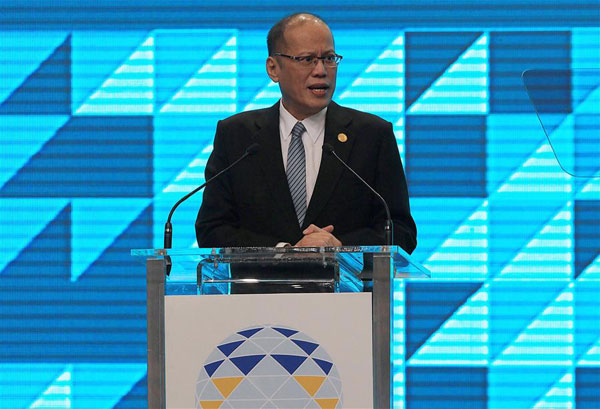APEC economic leaders highlight inclusive growth, FATTP
(Xinhua) Updated: 2015-11-19 19:29
 |
|
Philippine President Benigno Aquino III addresses the press conference at the close of the 23rd APEC Economic Leaders' Meeting in Manila, the Philippines, Nov. 19, 2015.[Photo/Xinhua] |
MANILA -- The Asia-Pacific Economic Cooperation (APEC) Economic Leaders' Meeting concluded here on Thursday, with the 21-member economies issuing a joint declaration focusing on inclusive economic growth and a wider free trade area in the entire region -- the Free Trade Area of Asia-Pacific (FTAAP).
According to the declaration, the leaders said that they will fully realize the vision of a stable, integrated and prosperous community in the Asia-Pacific region, in which all members can enjoy the benefits of economic growth and technological progress.
They said that the global growth is uneven and continues to fall short of expectation, adding that risks and uncertainties remain in the global economy, including inadequate demand growth, financial volatility, and structural problems weighing on actual and potential growth.
Holding this in mind, the APEC member economies agreed to build inclusive economies by supporting comprehensive and ambitious structural reforms so as to achieve positive economic, social, and environmental outcomes and promote good governance.
They also committed to deepen their financial markets, mitigate risks and foster micro, small and medium enterprises' (MSMEs) participation in regional and global markets as this year's APEC eyed the MSMEs as a major driver of regional economy.
The economies also vowed to build sustainable and resilient communities, make urbanization work for growth, invest in human capital development and enhance the regional economic integration agenda through strengthening collaboration and strongly supporting the work of the APEC and its other regimes.
Philippine President Benigno Aquino III told a press conference after the economic leaders' retreat that the leaders discussed critical regional and global issues they face as one Asia-Pacific region, adding that "if past APEC meetings were highly technical discussions on trade issues, the discussions over the past couple of days have taken a broader approach."
As there are about 150 trade agreements here in the Asia-Pacific region, the declaration echoed both APEC officials and leaders participated in the APEC CEO summit who showed the concerns of possible fragmentation in the region and called for a wider Asia-Pacific free trade area.
The leaders in the declaration reaffirmed their commitment to endorsing the FTAAP and making contribution to translate the vision of the FTAAP into reality.
"We reiterate our commitment to achieve the Bogor Goals of free and open trade and investment by 2020 and to the eventual realization of the Free Trade Area of the Asia-Pacific (FTAAP)," the document said.
In November 2014, APEC leaders endorsed the Beijing roadmap for APEC's contribution to the realization of FTAAP. The roadmap provides for a collective strategic study on issues related to the realization of the FTAAP to be concluded by end of 2016, as well as enhances information sharing and capacity building.
As this year's APEC was held following a series of horrible terror attacks around the world, the leaders also called for increased international cooperation and solidarity in the fight against terrorism.
Russia and France just survived through terror attacks recently and China on Thursday confirmed that the Islamic State killed a Chinese national.
"Under the shadow cast by the terrorist attacks in Paris, Beirut, and against Russian aircraft over the Sinai, and elsewhere, we strongly condemn all acts, methods, and practices of terrorism in all their forms and manifestations," said the declaration.
"We will not allow terrorism to threaten the fundamental values that underpin our free and open economies. Economic growth, prosperity, and opportunity are among the most powerful tools to address the root causes of terrorism and radicalization," the declaration added.
Eyeing the upcoming climate change conference to be held in Paris, the APEC leaders also reaffirmed their aspirational goals to reduce aggregate energy intensity by 45 percent by 2035 and double renewable energy in the regional energy mix by 2030 to achieve sustainable and resilient energy development within the Asia-Pacific.
In a separate statement issued the day after the leaders' meeting, the leaders also vowed to continue to work closely together to strengthen the rules-based, transparent, nondiscriminatory, open and inclusive multilateral trading system as embodied in the World Trade Organization (WTO).
The document said that the early entry into force of the WTO Trade Facilitation Agreement (TFA), which was approved as part of the 2013 Bali Package achieved at the 9th WTO Ministerial Conference, would make a significant contribution to the sustainability of global trade and highlight the value of the WTO to its stakeholders around the world.
"In this regard, we recognize the leadership of APEC economies, with more than half of them having ratified the TFA to date. We call upon the remaining APEC economies to do so as soon as possible," it said.
The statement also made pledges against all forms of protectionism, through commitment to a standstill until the end of 2018, and to roll back protectionist and trade-distorting measures.
The APEC Economic Leaders' Meeting kicked off from Wednesday to Thursday and the annual meeting will be held in 2016 in Peru.




